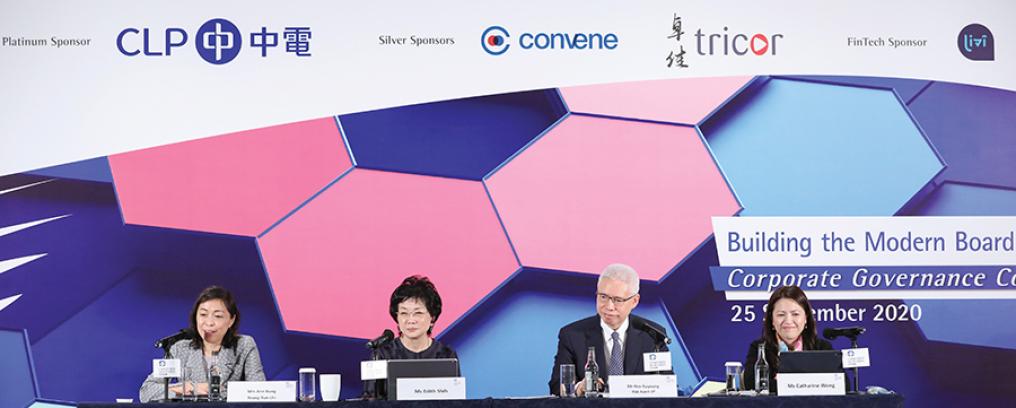Chen Liping, Executive Director and General Manager of CSSC Offshore & Marine Engineering (Group) Company Ltd, offers an interesting perspective on the role of the board secretary based on his own experience transitioning from financial management to governance.
In October 2009, I bid farewell to my position as the Chief Accountant of Guangzhou Wenchong Shipyard Company Ltd, and transferred to Guangzhou Shipyard International Company Ltd (GSI), which was renamed CSSC Offshore & Marine Engineering (Group) Company Ltd (COMEC) in May 2015. At that time, affected by the international financial crisis, the global shipbuilding market was faced with unprecedented adjustments. As the world’s largest shipbuilding country, the Mainland has been severely impacted by the slowdown in world economic growth, as well as a sharp decline in shipping trade. The reform and development of GSI was greatly impacted. The company’s A share stock price dropped from its peak at RMB100 to around RMB11, and its H share stock price also dropped to as low as around HK$7.
Against this backdrop, the company’s management team was eager to break through the constraints brought by the economic crisis and this posed a great challenge for me when I started my work. As the company faces the international market and is a manufacturing enterprise that makes export-oriented ships, any fluctuations in the exchange rate will have a huge impact on the company’s performance. Therefore, addressing exchange rate exposure became an important part of my role after I took office. Leading the company’s financial department, I improved the exchange rate risk prevention and control system, making it able to compare market exchange rate, rate changes and capital costs. I also hedged risks through a variety of innovative methods, including forward settlements and factoring, to prevent losses and create financial gains.
Through the joint efforts of the company’s management and the financial department, from 2010 to 2015, the company gained more than RMB700 million in financial income. Deficiencies at the operating level were also gradually reversed, main gross profit steadily increased and the company started to grow again.
Through my work in financial management, I started to appreciate the huge difference between non-listed and listed companies. Listed companies are public companies and need to be supervised by regulatory agencies and the general public, therefore the company’s finances must be rigorous and standardised. For listed companies, financial information is an important indicator reflecting operational quality, so it must be timely, complete, accurate and objective. This not only affects the judgement of information users, but also directly affects corporate credibility and the company’s market image, which further affects the company’s performance on fundraising, market value management and the implementation of corporate strategies.
People in charge of the financial management of listed companies must also pay attention to listing rules. From the accurate disclosure of accounting information, such as financial reports and performance forecasts, to the compliance requirements for connected transactions, refinancing, fund management and accounting policy changes, the financial officer must be familiar with relevant rules and best practices must be in place. In order to meet these compliance requirements, listed companies must have a solid financial management system and continue to improve their governance standards in financial information disclosure mechanisms, building teams of diverse talents, as well as setting up financial management norms and systems. These experiences all laid the foundation for my later career as a governance professional.
Moving to the next level
In 2012, although GSI made great efforts to adjust its structure, reduce costs and increase efficiency, due to the overall industry environment, there was no enthusiasm for trading of the company’s stocks in the secondary market and the company’s stock price was also hovering low. That year I was appointed as the board secretary and began to work more closely supporting regular board meetings and handling information disclosure, investor relations management and other corporate governance work.
As the person who used to be in charge of financial management, I had participated in the formulation of the company’s strategy and decision-making on important matters. I also fully understood the company’s operating conditions. Because of my participation in the formulation and implementation of the company’s business plan, I could more accurately grasp the current market environment, the measures taken by the company to respond to market competition and its potential financial impacts. I could also give investors a more comprehensive understanding of the company.
However, I needed to have a deeper understanding of the regulatory rules and information disclosure procedures, and I also needed to deepen my understanding of corporate governance and strategic development. This was when, by chance, I came into contact with the work of The Hong Kong Institute of Chartered Secretaries (the Institute). From the corporate governance training organised by the Institute to its annual roundtable meetings, the Institute provided me with effective help at a stage when I needed theoretical guidance and practical experience the most. These experiences deepened my knowledge and understanding of corporate governance and company operation from all aspects. Since 2012, I have been an Affiliated Person (AP) of the Institute and a supporter of the professional development of the Institute in the Mainland.
In 2013, the Clarkson’s Newbuilding Price Index gradually bottomed out. GSI’s management began to study market trends and industrial policies in the Mainland, and decided to initiate major mergers and acquisitions in order to seize the opportunities provided by capital acquisitions. From 2013 to 2015, the company implemented two major asset reorganisations. The first involved the issue of H shares from May 2013 to February 2014 in order to raise cash for low-level acquisitions of 100% equity of Guangzhou Longxue Shipbuilding Co Ltd (Longxue Shipbuilding). The second involved the issue of A shares from April 2014 to April 2015; these funds, together with cash payments, would enable the purchase of 100% equity of CSSC Huangpu Wenchong Shipbuilding Co Ltd and the shipbuilding assets of Yangzhou Kejin Shipbuilding Co Ltd.
The acquisition of the Longxue Shipbuilding was a second attempt. The first attempt, made in 2008, was terminated due to various reasons. In 2008, both the capital market and the shipbuilding industry were in downturn. Trading of the company’s A share and H share stocks was not enthusiastic, but the company was in urgent need of larger shipbuilding sites and facilities due to the restricted capacity of its old factories. Due to municipal planning, the company’s old factories were also under pressure to relocate. In order to effectively solve the company’s capacity bottlenecks and capacity transfer issues, and give full play to the company’s competitive advantages in brand, technology, experience, management and other aspects, the company took the initiative to launch the reorganisation in 2013.
However, the issue of H shares encountered several major obstacles – the first being the disagreement of internal and external directors; second the target’s issue price per share was lower than the company’s net assets; and third was that the target’s underlying debts were close to 100%, and the acquisition in a sustained downturn in the shipbuilding sector was not in line with market sentiment. As a major and unprecedented transaction, the road ahead was difficult and dangerous. Almost no large foreign investment banking institution was willing to support the acquisition, which was considered to be high risk. However, from the perspective of the company’s strategic development, as the board secretary, I always firmly believed that it was right to persevere – progress is achieved by people and we must innovate with courage while remaining in accordance with the rules.
I organised many preparatory meetings, and provided a lot of information and legal opinions relating to the Longxue Shipbuilding project and the benefits to the long-term development of the company, as well as the protection measures of the interests from small and medium shareholders and independent directors. This finally eliminated the doubts of the independent directors, and the project plan was successfully approved by the board of directors. In order to obtain the approval of the State-owned Assets Supervision and Administration Commission of the State Council to issue shares lower than their net asset value, I organised meetings for the management to coordinate and communicate with independent financial consultants, controlling shareholders, the China Securities Regulatory Commission (CSRC), Hong Kong’s Securities and Futures Commission (SFC), the Stock Exchange of Hong Kong (the Exchange), the Shanghai Stock Exchange and the State-owned Assets Supervision and Administration Commission of the State Council on many occasions. Finally, we successfully issued the shares.
To promote the acceptance of issuing H shares by the capital market and small and medium shareholders, we asked management to conduct roadshows in Shanghai, Hong Kong, Singapore and other places. Through intensive centralised roadshows and continuous communication with investment institutions and investors, we were able to focus the discussion on the significance of the issuance to the company’s business strategy and future performance prospects, and have successfully won the support of a large number of investment institutions and investors. The issue was finally approved by the SFC, the Exchange and the CSRC. The company’s first capital transaction since its listing was then completed.
Assisting this project also became a milestone for me in transitioning to a role as governance professional. I had already become deeply aware that a board secretary is not only the coordinator of company meetings and the executor of information disclosures, but is also a spokesperson for all parties involved in governance and the key person in a listed company to ensure best corporate governance practices. The important role of the board secretary in corporate governance and the capital operations of listed companies will be increasingly recognised.
Climbing to the top
In the course of my work, I have always adhered to the principles promoted by the Institute. As an AP of the Institute, I have always been committed to the formulation and implementation of good corporate governance policies. I also regularly participate in the corporate governance training organised by the Institute, and study the laws and regulations related to company secretaries and company administration. The Institute has deepened my understanding of law, finance, strategic development, corporate management and corporate governance in both Shanghai and Hong Kong, and I have gained practical experience in my work ensuring compliance with the regulatory requirements of both places, participating in capital operations and promoting best governance practices to companies.
In March 2016, I was appointed as an executive director and general manager of COMEC. Since taking over as the general manager, I have promoted good governance, and at a higher level and in greater depth. As an executive director and general manager, I adhere to the concept of high standards, strict requirements and zero mistakes at work. I recognise the importance of holding regular board meetings and ensuring quality information disclosure. My mission is to constantly improve the level of corporate governance and continue to promote convergence to best practices in listed companies.
Chen Liping
Executive Director and General Manager CSSC Offshore & Marine Engineering (Group) Company Ltd
SIDEBAR: A polymath perspective on governance
Are the roles of board secretaries, directors and general managers closely related? Chen Liping believes that although the roles of general managers, chief finance officers and board secretaries are different, and the way they each participate in corporate governance differs, they all share common goals and play the same role in promoting the company’s long-term development strategy. The board secretary, a key position in corporate governance, requires solid knowledge in finance, law and governance. Board secretaries are responsible for supporting the company’s board meetings, information disclosure and legal compliance. As part of the company’s senior management, they also need to understand and participate in the company’s operations management, assist in capital transactions and strategic planning, and provide suggestions for the company’s long-term development.
As the link between the company and the capital market, board secretaries also need to effectively coordinate internal and external relations, and connect with shareholders, regulatory bodies and the media, in order to maintain the company’s market image and enhance the company’s value. The above-mentioned roles not only make board secretaries important in the areas of governance and the operations for listed companies, but also widen the opportunities for career development. Mr Chen’s financial management experience gave him a good grasp of business management. This, combined with his experience as a board secretary, has made him an outstanding role model for people who wish to become chief corporate governance officers.
Kenneth Jiang FCIS FCS(PE), Chief Representative, Beijing Representative Office of The Hong Kong Institute of Chartered Secretaries



